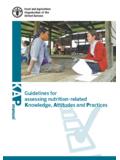Transcription of We are inviting you to take part in a research …
1 Template released by HRA (version 1) Please check HRA PIS and consent guidance for updates (this version was released on 10th February 2017) standard pack and should also be given verbally by the HCP. This means that the additional information provided to the patient about the research component (randomisation, data collection and use, additional risks etc.) can be relatively brief. This also applies to pragmatic trials involving unlicensed medicines 31 medicines that are used outside the terms of their UK licence or which have no licence for use in the UK but are commonly used in some areas of medicine, particularly paediatrics, psychiatry and palliative care due to the absence of suitable licensed treatments. Where the outcome data can be extracted anonymously via electronic records or via the patient s HCP, the consent process can be focussed on the research intervention itself.
2 However, in other studies, where it is not possible to extract outcome data in an anonymised way, informed consent will also need to be sought for accessing and sharing the patient s identifiable data and/or samples in addition to the intervention. The following is an example of a short Participant Information Sheet that may be adapted and used in a pragmatic trial conducted to compare two medicines or other treatments that are routinely prescribed within the NHS. [ Whilst the example here is presented in a traditional text format, it may be incorporated into a more user-friendly multimedia format. This PIS may also be adapted for use in other low-risk studies.] We are inviting you to take part in a research project called [Trial name]. You do not have to take part if you do not want to.
3 Please read this information which will help you decide. research Title: [ A research study to find out if [X] is better than [Y] for treating people with [medical condition]]. IRAS Reference Number: EudraCT trial number32/Other registry No. [As applicable] Why am I being asked to take part in this research ? You and your doctor have agreed that you would benefit from treatment for [patient s medical condition]. [X] and [Y] are [two] licensed/commonly used treatments routinely used to treat [patient s medical condition] and they are believed to be equally good. However, we do not know which is best. In order to find out whether [X] or [Y] is better we are inviting patients like you to take part in a research project in which some patients will be given [X] and some patients [Y] and the two groups of patients compared.
4 Although you would not receive any extra benefit from taking part, research like this helps to continually improve the treatments and care provided to all patients now and in the future. Do I have to take part? No. 31 See the General Medical Council s Good practice in prescribing and managing medicines and devices (2013) - Prescribing unlicensed medicines: for further information 32 Required by forthcoming EU Clinical Trials Regulation Template released by HRA (version 1) Please check HRA PIS and consent guidance for updates (this version was released on 10th February 2017) It is entirely up to you to decide. If you do not want to take part that s OK. Your decision will not affect the quality of care you receive. If you decide NOT to take part you and your [GP/Doctor/healthcare professional] will agree on which treatment you will receive.
5 This may be the same as the treatment you would have received by taking part in this research project. If you do decide to take part you are free to withdraw at any time, without giving a reason, by contacting your [GP practice/Doctor/healthcare professional]. What will I need to do if I take part? If you agree to take part in this research you will be given either [X] or [Y] both of which are used to treat [patient s medical condition]. [Or if cluster design33: If you agree to take part in this research you will be given [X/Y] which is routinely used to treat [patient s medical condition] in the NHS but may not be the treatment usually prescribed by [your GP/GP practice/Doctor/this hospital etc.]. Everybody taking part in this study, in this [describe cluster unit: ward/hospital/GP practice etc.]]
6 ] will be treated with [X].] You do not need to do anything more. All the information needed for the research (but not anything that could identify you) will be collected from your medical records and shared with the researchers. [Describe any additional samples/tests etc. beyond normal care] If you choose to take part in this study, it will last for [duration of individual participant s involvement]. The entire research will last for [duration of study]. You will not have to make any extra visits to your doctor over and above those needed for your normal care. At the end of the research , or earlier if you experience any unpleasant side effects, your [GP/Doctor/healthcare professional] will discuss with you whether you should continue with the treatment you are taking or switch to another treatment.
7 What are the disadvantages/risks? [There are no extra risks involved in taking part in this research .] [There are only minimal risks involved in this research . These are (provide detail of any potential risks due to additional research procedures)] The possible side-effects of the medicine you are given will be explained by your [GP/Doctor/healthcare professional] and are also provided in the information leaflet that comes with that medicine. If we do find that one treatment is better than the other for you the trial will be stopped [and you will be switched to the better treatment] A summary of the results of this research will be made available to all those taking part who would like to receive this34. [Provide details of how the results will be made available] What will happen to information collected about me during the study?
8 33 A type of research design that randomises the drugs or treatments being investigated to different groups or clusters of individuals (such as households, primary care practices, hospital wards, classrooms, neighbourhoods or communities), rather than individuals. 34 See HRA Information for participants at the end of a study: Guidance for Researchers for more information: Template released by HRA (version 1) Please check HRA PIS and consent guidance for updates (this version was released on 10th February 2017) Your medical information will be kept strictly confidential by your doctor. The researchers will only be given as much information from your medical records as is needed for this research and that information will be anonymised. They will not be given your name, where you live or anything that could identify you.
9 Who is organising and funding the research ? This study is being carried out by [details of researcher(s), Sponsor and institution(s)]. [If applicable: The researchers will pay your GP/GP practice/Hospital etc. [amount] for including you in this study.] The research is funded by [name of funder (if different from Sponsor)]. Thank you for reading this information and for considering taking part in this research Further Information: You can ask your [GP/Doctor/healthcare professional or other nominated person] any questions you may have about the study. You may also obtain more detailed information about this research , including how your medical information will be used, your privacy protected, and the compensation arrangements in the unlikely event that anything goes wrong from [this website: [URL] and/or your GP/Doctor/healthcare professional etc.]
10 ] Contact Details: Your [GP/Doctor/healthcare professional]: Chief Investigator: PIS Version No.. consent in postal/self-completion surveys For postal/online surveys or self-administered questionnaire-based research , it is not necessary to include a separate Participant Information Sheet or consent form. Participants should still be provided with sufficient information to enable them to reach an informed decision whether to complete and return the survey/questionnaire or not but this may be included as a short introductory paragraph as part of the survey/questionnaire itself or included in a short covering letter. Provided that the information adequately describes in broad terms the nature and purpose of the research , why they are being invited to take part, how the information collected will be used and stored, and how the findings might be made available to them, then completion and return of the survey/questionnaire will indicate consent on behalf of the participant.






